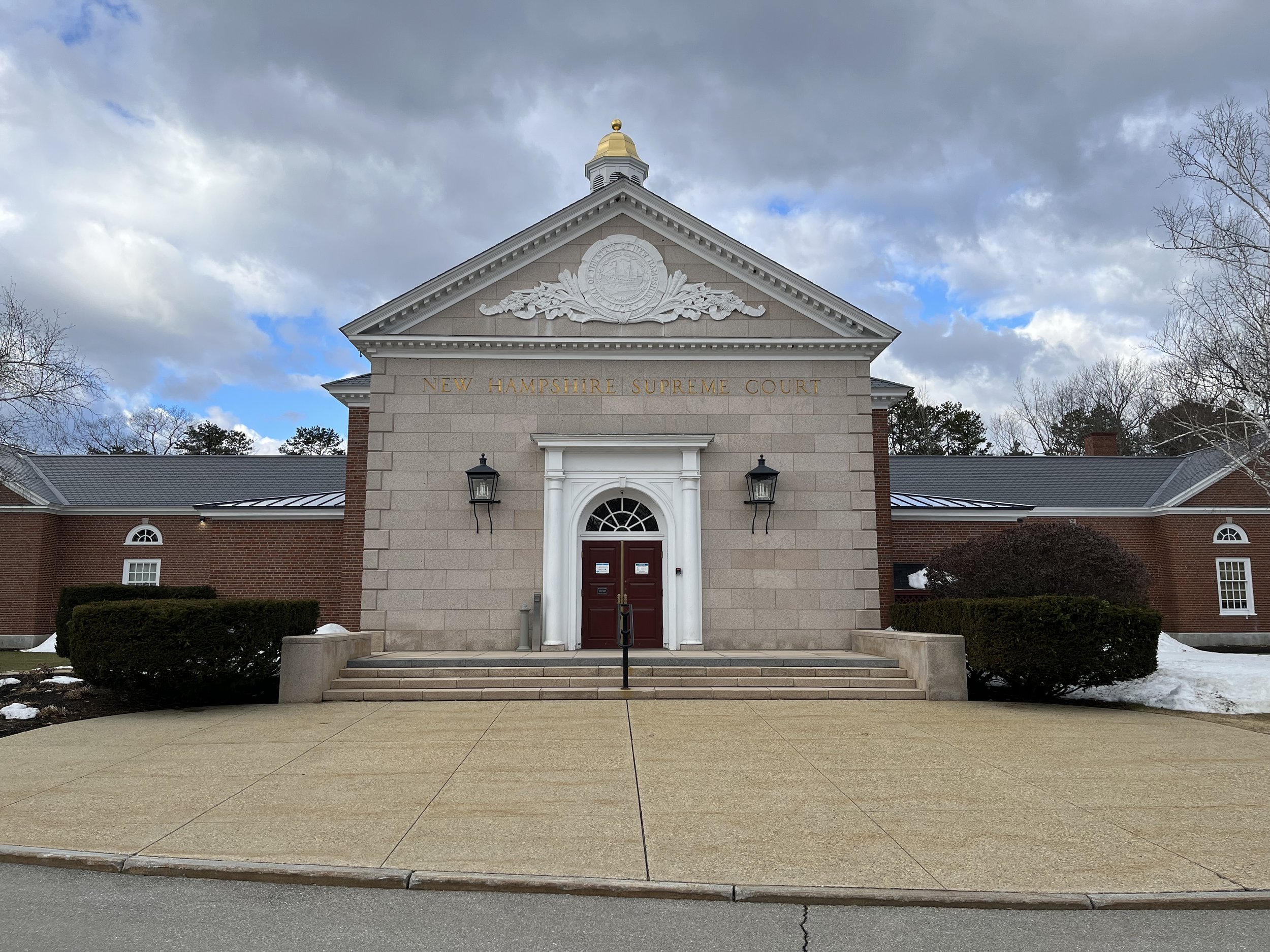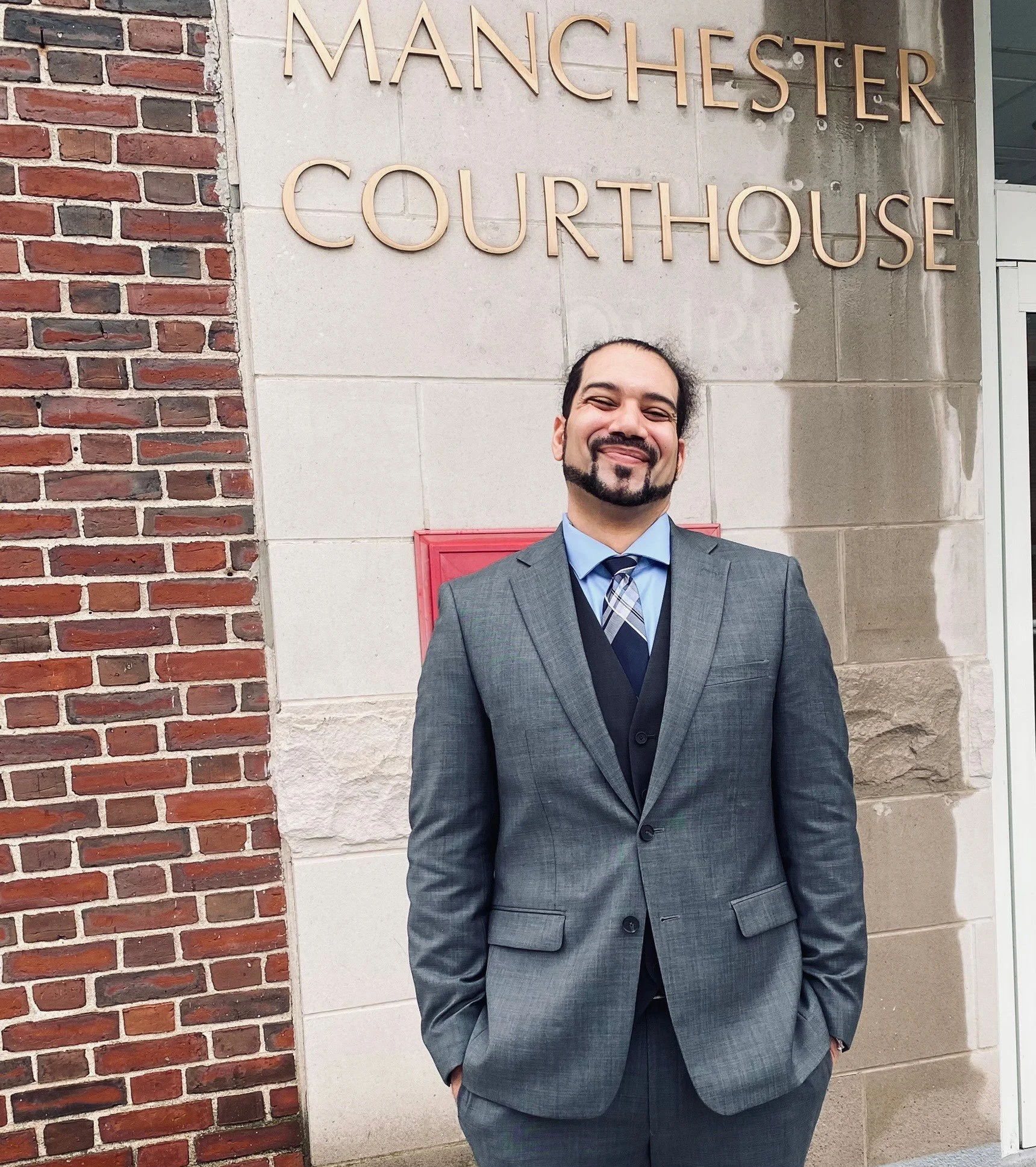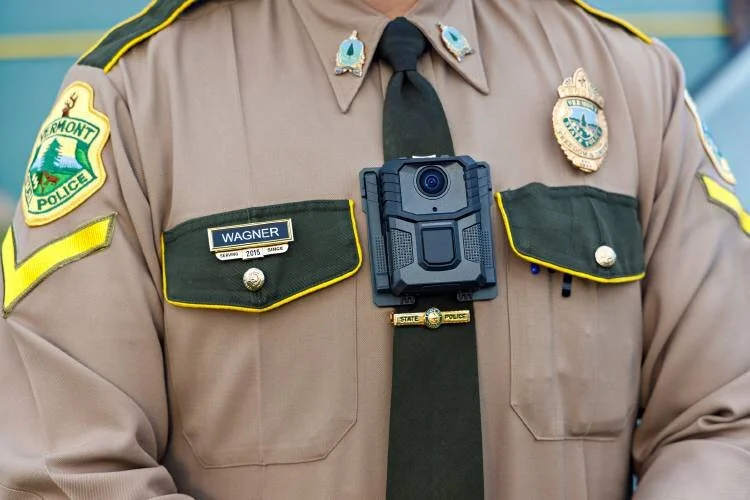The evening of March 6th was a full house at the UNH Franklin Pierce School of Law’s Warren B. Rudman Center for Justice, Leadership & Public Service in Concord, NH, where more than 50 people gathered for a Community Conversation on the Culture of Policing, and 36 others joined online. After a moment of reconnecting and conversations in the lobby, the enthusiastic crowd settled into the auditorium.
N.H. Supreme Court weighs confidentiality of police disciplinary files
The New Hampshire Supreme Court heard arguments Tuesday in a right-to-know case that could have major implications for police transparency in the state.
The case involves one specific public-records request — the ACLU of New Hampshire’s pursuit of materials about a state trooper, Haden Wilber, who was fired in 2021. But it poses a larger question: whether the public ever has a right to view internal police personnel files that document misconduct.
Troopers testify about store receipts, other evidence in Armando Barron's murder trial
States, cities rethink use of police traffic stops as investigatory tool
It’s a common tactic: a police officer gets a hunch about a vehicle, uses a minor traffic violation to pull it over and questions the driver about their travels, checking out suspicions that have nothing to do with traffic safety. In states around the country, officials are reconsidering whether it’s a good idea. It’s unclear if New Hampshire safety officials are following suit.
Examining racial bias when police make stops based on suspicions
N.H. State Trooper Haden Wilber was stationed on Interstate 95 in Hampton one afternoon in February 2019 when he began following a car he found suspicious, a Toyota Camry with tinted windows and Connecticut plates.
“The vehicle had drawn my attention to it due to how clean it was, given the age of the vehicle and current weather conditions in New England,” Wilber wrote in a police report.
‘Why did I get stopped?’ -- State police use minor traffic violations to search for drugs
Judge says State Police records on fired trooper should be made public
Fired State Trooper fights to get his job back
Fired State Trooper fights to get his job back
Police body-worn cams: ‘It’s just beneficial for finding out the truth of the matter’
On the night of Aug. 19, 2021, Torres, 40, was among a group of people police describe as in a near-riot state. On the pavement, covered by a tarp, was 67-year-old Beverly Avery, a Hispanic woman who was struck and killed by a motorist. (The identity of that driver still has not been released by police who only will say he is 22-years-old and from Bedford. Chief Allen D. Aldenberg said the results of the investigation are with the Hillsborough County Attorney’s Office who will decide how to proceed.)
Missing children: NH doesn’t track pre-school kids; community has a role to play in protecting the vulnerable
With a search for 7-year-old Harmony Montgomery ongoing for weeks now, the question still being asked, but for which the answer remains elusive, is how does a child go missing for more than two years and neither police nor child protection services know about it?
“The more provocative question would be who noticed the child when she wasn’t missing,” said Moira O’Neill, Director of the New Hampshire Office of the Child Advocate, which has oversight for the state Department of Children, Youth and Families (DCYF). She is not seeking reappointment to her post which expires on Jan. 31, 2022.
Police say Wilton man shot ex-girlfriend, then killed himself
Nearly two months before she was shot in the head after leaving her job at a sail manufacturer in Salem, Massachusetts, a 33-year-old Hampton woman filed a restraining order against her ex-boyfriend, a Wilton man who police say shot her and then killed himself on Monday night.
The woman, who is still alive and in critical condition at a Boston hospital, has not been identified.
Granite State AAPI Communities stand up and speak out to Stop Asian Hate
The recent shootings in Atlanta, Georgia, that killed eight people, six of whom were Asian women, has sparked a national conversation about Asian American discrimination and agression.
That conversation has made its way to New Hampshire, where Asian Americans make up 3% of the population, making them the second largest minority in the state. On NH PBS’ The State We’re In, Dr. Monica Chiu, who teaches Asian American studies and English at the University of New Hampshire, said blaming Asian Americans for national hardship or illness has been seen before in American history.
More New Hampshire Police Will Soon Wear Body Cams
Data suggests racial bias in NH traffic stops
State Trooper Michael Arteaga was parked in an unmarked cruiser on the north side of the Hampton tolls on a clear spring evening in 2018, when he noticed two men driving north in a late model Cadillac sedan with Connecticut plates.
[. . .]
The trooper eventually turned on his blue lights and had the Cadillac pull over, ostensibly for going 67 mph in a 50-mph zone and for making a lane change without timely use of signals. What followed was an interrogation and a search that turned up contraband.
Changes May Be Coming In How Police Are Deployed In Schools
When it comes to the question of armed and uniformed police officers as a permanent presence in the public school system, emotions run high on both sides of the argument. Debate over school resource officers, as they are known, has for years been a regular feature of New Hampshire town meetings and school board deliberations.
Local officials will soon have new guidance on the issue, thanks to the work of the governor’s commission on police accountability. Officially known as the New Hampshire Commission on Law Enforcement Accountability, Community and Transparency, the 14-member commission was appointed by Gov. Chris Sununu last spring amid national protests over systemic racism in policing.
State Commission Makes Recommendations on Pretextual Stops
[Pretextual stops are] when an officer pulls over a motorist for a minor traffic or equipment violation and proceeds to investigate more serious crimes, usually drug related. Many in law enforcement insist the stops are useful for investigating a variety of crimes, especially drug trafficking, while civil rights and racial justice advocates say the stops disproportionately target people of color.
The issue of pretextual stops was front and center in the deliberations of a commission appointed by Gov. Chris Sununu over the summer, tasked with improving law enforcement accountability and transparency after the murder of George Floyd at the hands of a Minneapolis police officer.
Police Academy Expands Implicit Bias Training from Two Hours to Two Days
Members of New Hampshire’s Commission on Law Enforcement Accountability, Community and Transparency (LEACT) attended Fridell’s program last year to help brainstorm a new two-day seminar on implicit bias training in the Granite State that launched at the police academy on January 14.
The expanded program for police recruits is one of 48 recommendations the LEACT committee advanced after meeting during the summer months. The 16 hours of implicit bias training draws on the philosophies from the FIP program. It also models lesson plans from Ohio’s Peace Officer Basic Training for Community Diversity & Procedural Justice.
What Would Police Reform Look Like in NH and Will it Happen?
Julian Jefferson, a staff attorney in the New Hampshire Public Defender’s office, has represented victims of racism and experienced it firsthand.
“I am a black man,” he said in his testimony before the Commission on Law Enforcement Accountability, Community and Transparency. “I have lived in New Hampshire since 2008. I have been working in the criminal justice system since 2011. I can tell you that racism exists in this state and in our criminal justice system.”
State Meets Many Police Reform Deadlines, Much Left To be Done
The Commission on Law Enforcement Accountability, Community and Transparency has been quietly at work since June. Although its meetings over the summer were public, they received little attention amid the noise of a national election, a public health crisis and a struggling economy.
That’s about to change with the new year, as legislation to implement the commission’s findings begins to work its way through the State House and the reality of what is being proposed becomes more apparent to the many stakeholders.




















